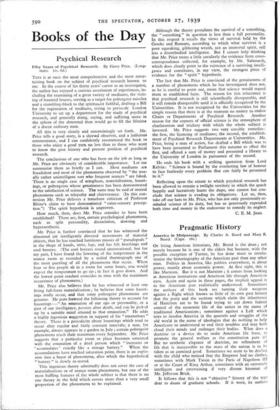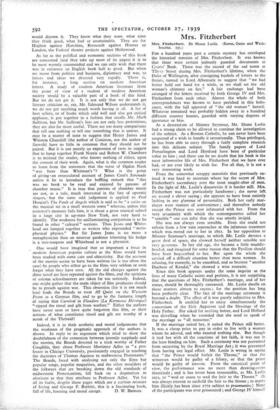Pragmatic History
America in Midpassage. By Charles A. Beard and Mary IL Beard. (Cape. t8s.) OF living American historians, Mr. Beard is the dean ; not merely because he is one of the elders but because, with the possible exception of Turner, he has done more to revolu- tionise the historiography of the American past than any other man. Politics in America, like politics everywhere, is about power, mainly about economic power. At first sight, this is like Marxism. But it is not Marxism ; it comes from looking at American institutions and American life through American eyes. Again and again in these pages, the implicit appeal is to the American past realistically understood. Sometimes the authors of this book are turning their weapons against a Right which knows so little of its own past history that the party and the sections which claim the inheritance of Hamilton are to be found trying to cut down federal control of the economic life of the union in the name of traditional Americanism ; sometimes against a Left which tries to involve America in the quarrels and struggles of the old world in the name of ideologies that do nothing to help Americans to understand or end their troubles and may both cloud their minds and endanger their bodies. What does a doctrine or a device do to make American life freer, to promote the general welfare as the constitution puts it? But no aesthetic elegance of doctrine, no refinement of life that is inaccessible to the mass of the nation is to be taken as an unmixed good. Sometimes we seem to be dealing with the child who noticed that the Emperor had no clothes, sometimes with Mark Twain in the Paris of Napoleon III or at the Court of King Arthur, sometimes with an extremely intelligent and entertaining if very distant kinsman of Mr. Jefferson Brick.
It follows that this is not " objective " history of the type dear to deans of graduate schools. If it were, its authors would disown it. They know what they want, what aims they think good, what bad or unattainable. They are for Hogben against Hutchins, Roosevelt against Hoover or Landon, the Federal theatre projects against Hollywood.
As far as the political and economic sections of this book are concerned (and they take up most of its pages) it is to be most warmly commended and we can only wish that there was in existence an English book half as good. But when we move from politics and business, diplomacy and war, to letters and ideas we descend very rapidly. There is, for instance, a long section on modern American letters. A study of modern American literature from the point of view of a student of modern American society would be a valuable part of a book of this kind. But we do not get it. It is not only that we do not get literary criticism as, say, Mr. Edmund Wilson understands it, we do not get anything much worth having at all. A list of best sellers, or of books which sold well and also got critical applause, is put together in a fashion that recalls Mr. Mark Sullivan, but Mr. Sullivan's lists are not only less pretentious, they are also far more useful. There are too many comparisons that tell one nothing or tell one something that is untrue. It may be a matter of taste to suggest that Henry James and Winston Churchill (the author of Coniston, not the author of Savrola) have so little in common that they should not be paired. But it is not merely an expression of taste to suggest that to lump together Frank Norris and Robert W. Chambers is to mislead the reader, who knows nothing of either, upon the content of their work. Again, what is the common reader to learn from the statement that the verse of Ogden Nash " was freer than Whitman's "? What is the point of giving • an emasculated account of James Cain's Serenade unless it be to introduce the baffling remark that " this was no book to be read and enjoyed by patrons of chamber music." It is true that patrons of chamber music are not, as a rule, much interested in the fate of operatic singers, • but the same odd judgement is applied to Paul Horgan's The Fault of Angels which is said to be "a satire on the musical set in a small western town " whereas, unless this reviewer's memory fails him, it is about a great musical school in a large city in up-state New York, not very hard to identify. The weakness for =illuminating comparison is to be found in other " cultural " sections. Thus Jeans and White- head are lumped together as writers who expounded " meta- physical physics." But Sir James Jeans is no more a metaphysician than an amateur gardener trimming his hedge is a tree-surgeon and Whitehead is not a physicist.
One would have imagined that so important a force in modern American popular culture as the films would have been studied with some care and objectivity. But the account of the movies seems to have been written (as is too often the case) by people who either go to the films very seldom or soon forget what they have seen. All the old charges against the dime novel are here repeated against the films, and the opinions of solemn schoolmasters are taken far too seriously. Indeed, one might gather that the main object of film producers should be to preach against war. This obsession (for it is not much less) leads the Beards to treat All Quiet on the Western Front as a German film, and to go to the fantastic length of saying that Carnival in Flanders (La Kermesse Heroique) " ripped the tinsel and gilt from warfare." Either the authors have never seen or have quite forgotten this film, or their notions of what constitutes tinsel and gilt are worthy of a monk of the Thebaid I Indeed, it is in their aesthetic and moral judgements that the weakness of the pragmatic approach of the authors is shown. In reply to an argument which tried to show the doubtfulness of the connexion between juvenile turpitude and the movies, the Beards descend to a trick worthy of 'Father Coughlin, they abuse Professor Mortimer Adler as " a pro- fessor in Chicago University, passionately engaged in teaching the doctrines of Thomas Aquinas to midwestem Protestants." The Beards, faced with analysing not only the films but popular songs, popular magazines, and the other moulders of the folkways that are breaking down the old standards of midwestern Protestantism, fall back on a dogmatism as obstinate as that they attribute to Professor Adler. Yet for all its faults, despite those pages which are a curious mixture of Irving and George F. Babbitt, this is a fascinating book, full of life, learning and moral energy. D. W. BROGAN.









































 Previous page
Previous page